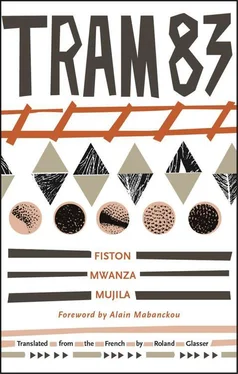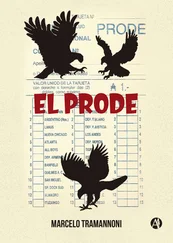“Do you have the time?”
Outside, no decent lighting of any kind. He hesitated to take shortcuts, for fear of running into a gang of hoods. Requiem had been walking down Authenticity Street one day when he fell into the clutches of some armed men, who snatched both his merchandise and his clothes. He’d managed to get back to Vampiretown thanks to a single-mama-chick who’d lent him her spare dress.
People used to have power twenty-four-seven, before companies started sprouting like mushrooms. The term “blackout” didn’t appear in the dictionary. People were not dependent upon electricity. Then came the rush, the for-profit tourists, and their companies excavating for raw materials. Then the rebellions and mutinies. The first talk of blackouts appeared around the 1990s. Buoyed up by his victories over the regular army, the rebel leader of the time, half-brother of the dissident General, key shareholder in some seventy-six firms, and brother-in-law of an investor renowned for his largesse, burst onto the airwaves and declared: “You will receive power four days a week, to ensure that businesses can operate at full tilt.” As time passed, he adjusted his decree to two days, then one, then two hours, reasoning that the processing plants for the minerals so dear to the tourists require more electrical power, that the inhabitants of the City-State don’t have much need for it, and that the machinery meant to be supplying this power is rusting under the weight of the years: it dates from the building of the station, which is essentially an unfinished metal structure, gutted by artillery, train tracks, and locomotives that call to mind the railroad built by Stanley. Lucien strode along Independence Street. He took the curve of International Armistice Street, then turned onto Gravedigger Street in spite of himself, but avoided venturing too far down this narrow thoroughfare. Two men approached him, beaming.
“What size would you like, sir?”
The little street was full of commission agents, hired mourners, gravediggers, and hawkers of first and second-foot coffins.
“My condolences, sir, is it your daughter who’s just …”
They laid out their wares on either side amid unrivaled pandemonium. Their trade drew so-called businesswomen who erected straw shacks from which they slung grub, hemp, and traditional beer, which in turn drew musicians, baby-chicks, itinerant Pentecostal preachers and other rubberneckers of that ilk, open-air concerts, striptease shows, and simulated orgasms and fellatio, as the chronology would have it.
“How old was he when he passed?”
Their strategy was to welcome with open arms, to commiserate with the potential client, to explain that they were there to cry with him, to pass themselves off as a friend, to suggest a product.
“Ebony wood, negotiable …”
A horde of kids ran after him.
“Sir, we work for less.”
Eyes shriveled by cigarettes and alcohol. Potbellies full to bursting with roundworms, amoebas, earthworms, and assorted mollusks. Heads shaved with knives. Arms and legs stiff with digging graves from morning till morning. They were close to ten, maybe twelve years old. They toted the same justifications: “We’re doing this to pay for our studies. Dad’s already gone with the locomotives. He doesn’t write no more. Mom’s sick. The uncles and aunts and grandmothers say we’re sorcerers and it’s because of us that dad got married a third time and that our sorcery comes from mom and that we should go see the preachers who will cut the links by getting us to swallow palm oil to make us vomit up our sorcery and prevent us flying around at night.” They lived off a multitude of rackets, like all the kids in town.
“We’re not expensive. Our condolences first!”
They worked as porters at the Northern Station, and on the Congo River and at the Central Market, as slim-jims in the mines, errand boys at Tram 83, undertakers, and gravediggers. The more sensitive ones stood guard at the greasy spoons abutting the station, whose metal structure recalled the 1885s, in exchange for a bowl of badly boiled beans.
He stopped, got out his notebook, wrote: “Childhood, zero to two years old. Puberty, three to seven years old. Adolescence, eight to twelve years old. At fifteen, you already start scribbling your will.” “There’s no shortage of dead,” Requiem was fond of saying; he who regularly traded his merchandise for coffins he sold on to tourists when they lost their workers in cave-ins. Lucien felt bad when he saw those poor faces ready to do anything to survive. RULE NUMBER 23: every day is a pitched battle. As soon as dawn breaks you wonder what you’re going to eat, and then, with the sun, you reintegrate the cycle of the City-State, you fish, you dig, you scavenge, you glean, you devise, you fuck, you sweat, you sell, you trade, you peddle, you abuse, you corrupt, you drink, you shit in the stairwell, you identify with the jazz, you taunt the white tourists. Everything can be liquidated, each devises their own system. He thought about his Clignancourt friend: “I’m making contacts with all the theaters, and you, you wander about in the open air, how’s that a way to live, Lucien!” He thought of Gandhi’s face at Karl Marx’s commentary on the expropriation of the rural population. He thought about the Negus justifying himself: “Life expectancy here is forty-one years, whether you like it or not! I’m filling the four years I’ve got left as I see fit.” He stared at the coffins, on either side. Wrote in his notebook: deaths corresponding to professions.
MINERS
Cave-ins
OR DIGGERS,
Suicide (hanging, overdose, etc.)
IT DEPENDS
Radioactivity
Drugs or traditional alcohol
Vendetta
Sexually transmitted diseases
BABY-CHICKS
Abortion
Childbirth
Rape
Pneumonia
Sequestration
Sexually transmitted diseases
He remembered the article he’d read the previous day. On the front page, a ten-year old girl gives birth to a child weighing twenty-one pounds; the father of the newborn, a thirty-year-old digger carried off by the cave-in before last.
SLIM-JIMS
Cave-ins
Radioactivity
Roundworm
Sexually transmitted diseases
STUDENTS
Mown down by trains
Suicide
Poisoning for those who try to show off
Clashes with the miners
(Hunger) strike
Sexually transmitted diseases
SINGLE-MAMAS
Bad luck
Sexually transmitted diseases
“I’m horny, take me far away from here, far from these vipers, and turn me on.”
“Missionary position or doggy-style, I’m ready to do the freakiest stuff.”
“I don’t have syphilis, that’s the only good news.”
He turned the page and scrawled: “They’ve lost their knowledge of hoe and fishhook. What will they sink their teeth into when the earth, for all its copper and diamonds, rejects them. Flashes of lightning initial the myths long maintained by these railroads that haunt the most wounded imaginations, the desire to see that other part of oneself sinking ever further.” He was reminded of his third dream: heavily bearded kids insisting he either pay them to dig his own grave or else flee aboard the first train for the Back-Country …
“Do you have the time?”
“I don’t like banks. That’s just my opinion.”
“I give marvelous head.”
“Let’s go far away from here. Take me to Graz, or Moscow even. Yes, I love your country.”
He crossed a nameless street, lit a cigarette, Tram 83 in the distance.
JOURNAL OF A RETURN TO TRAM 83.
The Tram retained its botched-night splendor. It stayed the same, yesterday, today, and the day after. Beers were served fifteen minutes late. The waitresses and the busgirls, supported by the mother superior, mocked the world about them. The baby-chicks, all welcoming smiles, accosted the clients with no distinction. The mixed facilities remained overcrowded. The men entered and exited as happy as ever.
Читать дальше












